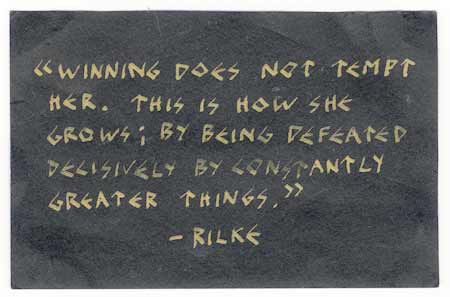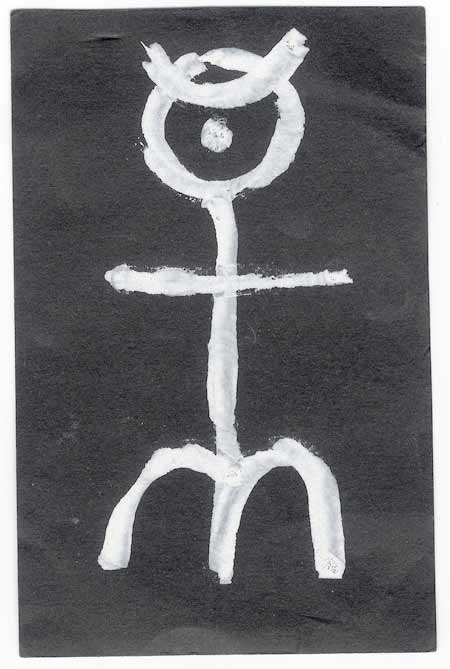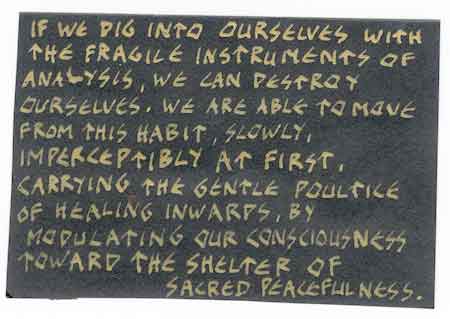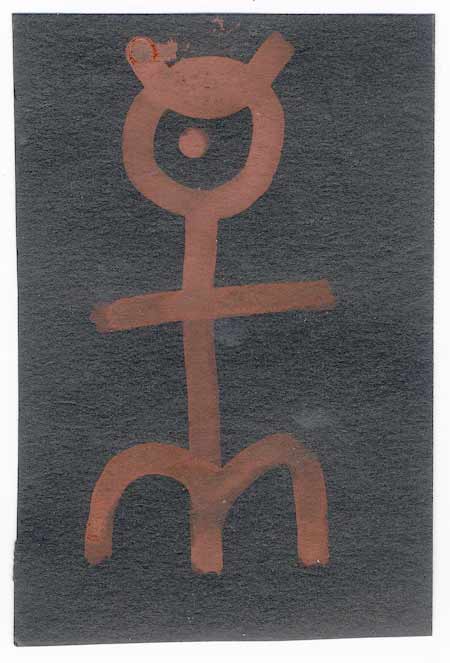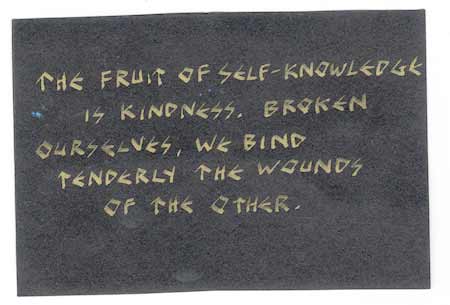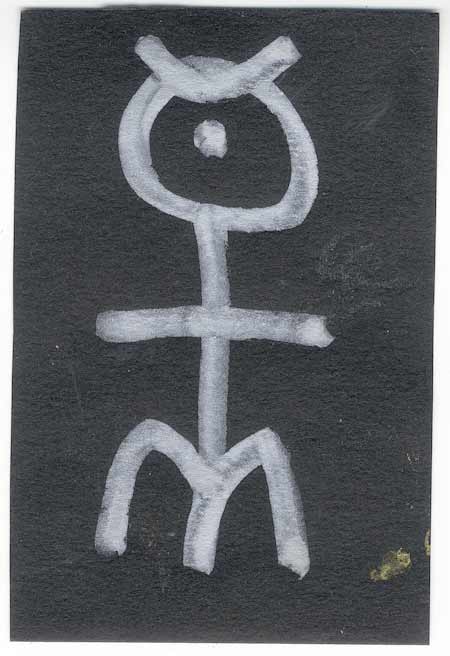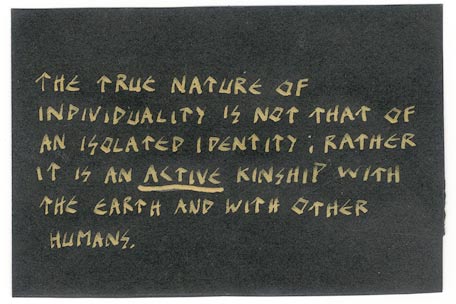
In October of 2005, I received a phone call from a friend, Paul, asking if I would make a piece of art for his sister, Lisa, who was then at her lowest ebb, in a long-running crisis which had just seen her hospitalized.
The next couple of days birthed the following card deck, the text culled mostly from my notes and owing a very great deal to the work of contemporaries writing around the topic of the Dark Night Of The Soul. The salvific words, greatly treasured, of John O'Donohue and Joan Chittister, are well represented here.
The deck was my introduction to Lisa who I hadn't met before. Since that time, we have become dear friends. Lisa now lives locally. Although her struggles remain great, she has her own little apartment in the 'happening hood', a growing circle of gentle friends, a low-key and artful life, and an ever-present companion in one of the handsomest doggies in town, Bodhi.
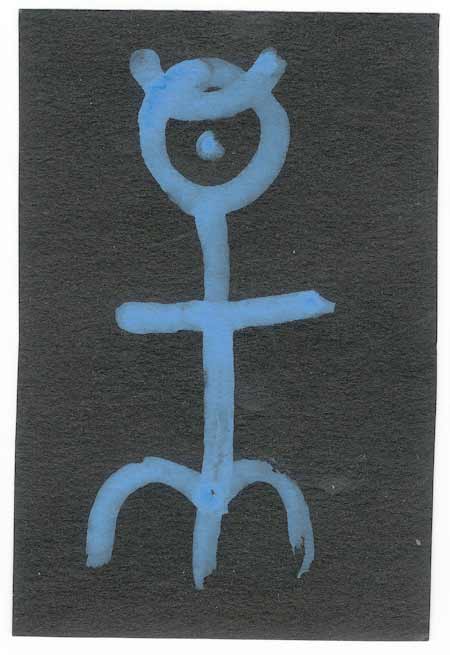
1. “Winning does not tempt her. This is how she grows; by being defeated decisively by constantly greater things.” – Rilke
2. When you begin to understand how your pain may be creative in the unseen world, this can help a sense of purpose to unfold. Gradually, your sense of the deeper meaning of your agony begins to bring out the concealed dignity of your suffering. It helps the smallness within you break open.
3. “Good people are good,” William Saroyan wrote, “because they come to wisdom through failure.”
4. The fires of suffering are disclosures of love. The marks and wounds that suffering leave on us are eventually places of beauty. This is the deep beauty of soul where limitation and damage, rather than remaining forces that cripple are revealed as transformation.
5. God is present in this world in a form that endlessly invites our longing, namely, in the form of absence. Simone Weil said: “the apparent absence of god in this world is the actual reality of God.”
6. You do not know what divine narrative God may be writing with the crooked lines of your struggles. “Awakening, freedom and sanity are only intelligible in the context of confusion, violence and chaos.” – Steven Batchelor.
7. Often, where we consider the divine to be absent, it is in fact present under a different name.
8. When lonely suffering is courageously embraced and integrated, it brings new light and shelter to the human family. Gifts and possibilities unexpectedly arrive on the tables of those in despair and torment. This understanding brings some consoling meaning to the isolation of pain. When the flame of suffering sears you, you are not suffering for yourself alone.
9. The mind is the eye of the world. When the mind changes, the world is different. “The mind altering alters all.”
10. To help carry the weight of pain that assails the world is a precious calling. Carrying this pain a little farther for others is a lonely and isolating experience. And yet, the call to suffering can be a call to bring healing to the world and to carry light to forsaken territories.
11. Follow poet, follow right
To the bottom of the night.
With your unconstraining voice
Still persuade us to rejoice.With the farming of a verse
Make a vineyard of the curse,
Sing of human unsuccess
In a rapture of distress;In the deserts of the heart
Let the healing fountains start,
In the prison of his days
Teach the free man how to praise.
- W.H. Auden12. Real struggle hurts. It leaves us wounded and chastened and different for the rest of our days. We limp forever because nothing else unmasks us to ourselves to the same degree. We know things now we never knew before. The humiliation of it singes our souls. The message of struggle is clear.
13. There is in struggle a challenge to those parts of us that cannot come fully to life except in the darkness of adversity. Real struggle marks us for life. It can leave us forever fearful, less arrogant, more open to others, timid, angry, more self-critical, less naïve, shamed. But whatever the wounds we are marked with, they can, if we allow them, mark us with wisdom.
14. The fruit of self-knowledge is kindness. Broken ourselves, we bind tenderly the wounds of the other.
15. Many of the places in our lives at which our growth has arrested are places where we have carried out negative baptisms. When we name a dimension of ourselves, we give it an identity; it then responds to us according to the tone of its name. We need to exercise great care and respect when we come to name something. We always need to find a name that is worthy and spacious.
16. “The fire-path of suffering is the final gathering place of all the ideas and intentions of Jesus.” – John O’Donohue
17. True beauty must be able to engage the dark desolations of pain. It is on this frontier that its finest light appears.
18. We cannot understand suffering, because its darkness make the light of our minds so feeble and thin. Yet we can trust that there is great tenderness at the root of pain, that our suffering refines us, that its fire cleanses the false accretions from the temple of the soul.
19. Perhaps the greatest calling of all is the all to integrate the hopeless darkness of the bleak valley of suffering into a divinity of presence. A kind of the truest kinship is made possible through suffering.
20. “God tests those most she loves most.” Al-Hallaj (Sufi, crucified.)
21. “Some infinitely gentle, infinitely suffering thing.” – Of Christ, T.S. Eliot
22. Enduring struggle is the price to be paid for becoming everything we are meant to be in the world. What we see is the fullness of the self come to birth the only way it really can: in labor and trial. – Joan Chittister
23. “Love, like fire, can only reveal its brightness on the failure and the beauty of burnt wood.” – Phillipe Jaccottet
24. “Few people nowadays know what man is. Many sense this ignorance and die the more easily because of it, the same way that I will die more easily once I have completed this story. I do not consider myself less ignorant than most people. I have been and still am a seeker, but I have ceased to question stars and books. I have begun to listen to the teachings my blood whispers to me. My story is not a pleasant one; it is neither sweet nor harmonious, as invented stories are; it has the taste of nonsense and chaos, of madness and dreams – like the lives of all men who stop deceiving themselves.” - Moustakas.
25. OPEN: we are called, in so far as we can, to live without an image of ourselves, or at least to keep the images we have free and open.
26. DIS-EASE: “Disease is not the enemy. It is an intelligent wise decision to come into balance.” – James Jealous, D.O.
“For with a wound I must be cured.” – Shakespeare
27. “Let me live to my sad self hereafter kind.” – Gerard Manley Hopkins
28. One of the hardest moments in life, perhaps, is the one in which I discover that there are some things about which I can do nothing at all. I have been bested, and there is nothing whatsoever that I can do about it. What I have now is all I have. And it is not what I want. In the end it is the resolution of the combat within the self that counts. And exhaustion is the key to it.
29. Surrender comes in grand ways and in small ones but, sooner or later I must admit that there is no turning back from the rejection or loss or ravages of the past. Life as I had fantasized it is ended. What is left is the spiritual obligation to accept reality so that the spiritual life can really happen in me.
30. “To come by what you are not, you must go by a way you are not.” – St. John of the Cross
31. How do you ever stop your consciousness going to war on itself? You cannot. Much as your agony is entirely god-given, your relief likewise is wholly an accident of grace. But you can make yourself more accident-prone.
32. We do not “make” ourselves sane as much as nurture the conditions which allow sanity to emerge. The healing path has nothing to do with force or control; but rather the persistent courage to be at ease with the unsolved and unfinished.
33. “Be patient toward all that is unsolved in your heart.’ – Rilke
34. “If you are willing to bear serenely the trial of being displeasing to yourself, then you will be for Jesus a pleasant place of shelter.” – St. Therese de Lisieux
35. Our desire to survive is a powerful instinct. When that desire is driven to the edge of its endurance, our cries for relief are often answered excrutiatingly slowly. At the first stage, just enough light is released to enable you to hold on to the edge of the cliff. Then over time a stronger light gathers to guide you back to shelter.
36. Hope is the last great gift to arise out of the grave of despair.
37. As with all manner of spiritual discipline, we gain most when we are willing freely to choose what is difficult.
38. If we dig into ourselves with the frail instruments of analysis, we can destroy ourselves. We are able to move from this habit, slowly, imperceptibly at first, carrying the gentle poultice of healing inwards, by modulating our consciousness toward the shelter of sacred peacefulness.
39. Healthy spirituality leads you back to the garden, which is the archetypal image of lovemaking, intimacy, and fertility, but always through another garden – Gethsemane.
40. Resurrection is frightening because it is a call to live a life without the walls of crippling definition or false protection.
41. The true nature of individuality is not that of an isolated identity: rather it is an active kinship with the earth and with other humans.
42. "The garden instructs us in a principle of life and death and renewal. In its rhythms it offers the closest analogy to the concept of resurrection that is available to us." - Stanley Kunitz
43. SHELTER: The garden lives the contemplative life. The garden sets our feet at large in the pastures of promise.
44. Until we allow some of nature’s stillness to reclaim us, we will remain victims of paralysis. The earth wants our minds: she is calling us to tranquility and rhythm. Your soul loves the danger of growth.
45. “We are the children of the clay who have been released so that the earth may dance in the light.” – John O’Donohue
46. “Earth, isn’t this what you want? To arise in us, invisible?” – Rilke
47. The more attentive you are and the longer you remain in a landscape, the more you will be embraced by the native rhythm of peace. Wisdom in work is the anchor of attentiveness. “Perform action as sacrifice.” – Bhagavad Gita. “Laborare est orare.” – Work is prayer.
48. I could not see what lay ahead, but I knew I could rely on myself. This lesson contined to be driven home when I started climbing. I could see how the hard move would start but not always how I’d get through it. The sequences became clear only by committing to the rock, only by starting upward.” – Laura Waterman
49. Notice the smallest light returning. Look to the small and subtle. Do what you are able the best you are able. That is enough.
“I bear what I must and be what I can.”
50. “Enlightenment is not a simplified state. Not at all. It is the supreme tolerance of cognitive dissonance.” – Robert Thurman
51. No journey is too long when you are coming home.
October 8, 2006
Lisa, so gentle and so generous, died this morning.
n.
